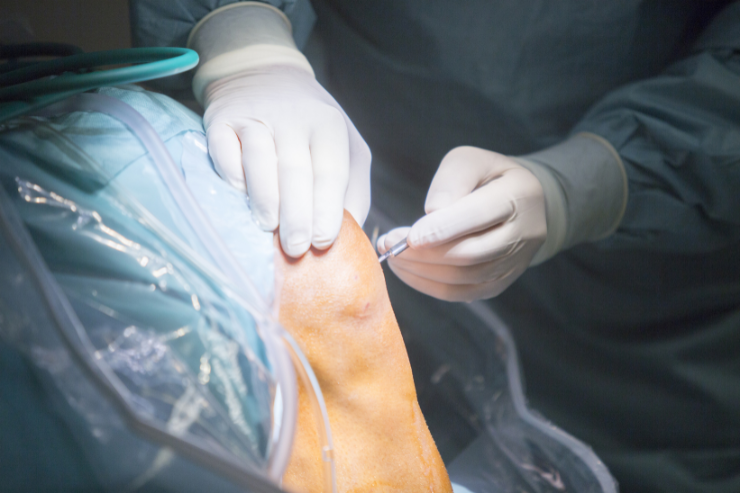Knee Arthroscopy
- Home
- Knee Arthroscopy

Knee Arthroscopy can be done under general anesthesia (asleep) or spinal anesthesia (awake). It allows visualization of the entire joint and is used to address cartilage or ligament issues. Depending on the treatment and physiotherapy requirements, patients may be discharged the same day or need to stay in the hospital for a few days.
ACL Reconstruction
The ACL, or Anterior Cruciate Ligament, is one of the key ligaments in the knee that connects the thigh bone to the leg bone. It runs through the center of the knee, crossing the Posterior Cruciate Ligament (PCL), and is crucial for controlling knee stability, especially during rotational movements like twisting and turning.
Is ACL Reconstruction necessary?
ACL reconstruction is recommended if your knee feels unstable or if you frequently experience your knee giving way or falling down. The surgery not only stabilizes the knee but also helps prevent further damage to the cartilage, reducing the risk of future arthritis.
What happens during ACL Reconstruction Surgery?
The procedure involves arthroscopy (keyhole surgery) to visualize and reconstruct the ACL. A graft, typically taken from the patient’s own hamstring or patellar tendon, is used for reconstruction. The graft is arthroscopically fixed in place with special implants. The surgery typically lasts about 1.5 hours. Patients can either go home the same day or stay in the hospital for a few days, depending on their physiotherapy and recovery. Most patients can walk the same day.
Cost of ACL Reconstruction Surgery
Dr. Das uses high-quality US or European ACL implants with proven success. The surgery is offered as part of an affordable package that includes the procedure, hospital stay, implants, and physiotherapy.
PCL Reconstruction
What is the PCL?
The Posterior Cruciate Ligament (PCL) is another important ligament inside the knee that connects the thigh bone to the leg bone. It crosses diagonally with the ACL and is responsible for controlling forward and backward movement in the knee. Like ACL injuries, PCL injuries often occur alongside other damage in the knee.
Is PCL Reconstruction necessary?
PCL reconstruction is suggested if you experience knee instability or frequent falls. It helps stabilize the knee and improve overall confidence in movement.
What happens during PCL Reconstruction Surgery?
Similar to ACL reconstruction, PCL reconstruction is performed using arthroscopy. A graft from the patient’s own hamstring or patellar tendon is used, and the ligament is reconstructed and fixed with implants. The surgery takes about 1.5 hours, and patients may go home the same day or stay in the hospital for a few days depending on their recovery and rehabilitation.
Cost of PCL Reconstruction Surgery
Dr. Das uses high-quality US or European implants for PCL reconstruction and offers the surgery in an affordable package that includes all necessary services.
Meniscus Repair and Partial Meniscectomy
What is the Meniscus?
The meniscus is a C-shaped cartilage in the knee that acts as a shock absorber, protecting the joint from wear. There are two menisci in each knee, and tears in the meniscus can cause pain and limited movement. In some cases, torn pieces of cartilage can catch in the joint, causing it to lock.
Is surgery necessary for a torn meniscus?
Meniscus tears can significantly impact daily life. Treatment depends on the tear’s size, location, age, activity level, and other factors. Arthroscopic surgery is often used to address meniscus injuries.
What happens during Torn Meniscus Surgery?
Arthroscopy is used to visualize and treat the tear. Dr. Das strives to repair the meniscus when possible, particularly in young adults and children. In irreparable cases, part of the meniscus is trimmed, but as much as possible is preserved. The surgery typically takes under an hour, with patients often able to walk the same day. Hospital stay depends on rehabilitation needs.
Cost of Torn Meniscus Surgery
Dr. Das uses US or European implants with a proven track record for successful outcomes. The surgery is provided as part of an affordable package that includes surgery, hospital stay, and physiotherapy.
Articular Cartilage Surgery
Is surgery necessary for articular cartilage damage?
If the damage involves a large attached piece of bone, surgical intervention to reattach it may be necessary, especially if the case is not longstanding. Surgical options include:
- Hyaluronic Acid Injection: These injections reduce pain and improve function by restoring the lubricating ability of synovial fluid in the joint.
- Debridement: Arthroscopic removal of loose cartilage flaps that may be causing issues.
- Microfracture: Small holes are made in the bone to encourage scar tissue formation to fill the cartilage defect.
- Mosaicplasty: This involves transferring cartilage plugs from non-weight-bearing parts of the knee to the damaged area, though this technique is less common now.
- Articular Cartilage Transplantation: This advanced technique involves harvesting healthy cartilage cells from the knee, culturing them in a lab, and then implanting them back into the knee. This is followed by a specialized rehabilitation program.
Cost of Articular Cartilage Surgery
Dr. Das uses high-quality US or European implants, offering the surgery in a customized package depending on the patient’s needs. This includes surgery, hospital stay, and physiotherapy.
